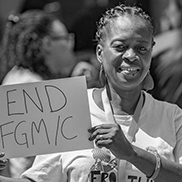
She was born in the small city of Lunsar, in the northwestern region of Sierra Leone. At a young age, she was subjected to female genital mutilation, suffering both physical and emotional scars. This personal experience had a profound impact on her and prompted her to gain a better understanding on the devastating impact of female genital mutilation, and to undertake steadfast advocacy to bring about change.
She was the first member of her community who publicly stood against female genital mutilation. As this practice was a form of livelihood for women, all by herself she persuaded 400 women in her community to discontinue this practice. She created alternative means of income for these women. She advocated that the traditional rituals of the Bondo community should not be associated with female genital mutilation. She defended this ritual as a space for exchange of experience and empowerment for women. She emphasised that alternative rite of passage is possible without denying the tradition.
At a time when female genital mutilation was not a priority issue for politicians and majority of civil society organisations in Sierra Leone, and was not seen as a harmful practice for women’s and girl’s life, in an effort to combat the practice, she founded the “Amazonian Initiative Movement” (AIM) in 2000. The organisation’s primary goal is to raise awareness about the harms of female genital mutilation, affecting more than 90% of women and girls in Sierra Leone, and to eliminate the practice altogether. By conducting fieldwork, she strives to reach out to rural areas and communities where the practice is most prevalent, and forms local women’s groups and networks. She organises training activities in cooperation with local and international organisations.
Thanks to her struggle, she has succeeded in shifting the perceptions in her community to a great extent, and empowered women to stand against this harmful practice. She has become a leading figure in combatting female genital mutilation, and has been widely recognised by numerous awards.
Her resolve in combatting female genital mutilation has raised a far-reaching awareness not only in Sierra Leone, but across Africa and even around the globe. The “Bloodless Rite of Passage” she led in 2019, was adopted by the “Forum Against Harmful Practices” as well as numerous organisations and institutions.
She was the first member of her community who publicly stood against female genital mutilation. As this practice was a form of livelihood for women, all by herself she persuaded 400 women in her community to discontinue this practice. She created alternative means of income for these women. She advocated that the traditional rituals of the Bondo community should not be associated with female genital mutilation. She defended this ritual as a space for exchange of experience and empowerment for women. She emphasised that alternative rite of passage is possible without denying the tradition.
At a time when female genital mutilation was not a priority issue for politicians and majority of civil society organisations in Sierra Leone, and was not seen as a harmful practice for women’s and girl’s life, in an effort to combat the practice, she founded the “Amazonian Initiative Movement” (AIM) in 2000. The organisation’s primary goal is to raise awareness about the harms of female genital mutilation, affecting more than 90% of women and girls in Sierra Leone, and to eliminate the practice altogether. By conducting fieldwork, she strives to reach out to rural areas and communities where the practice is most prevalent, and forms local women’s groups and networks. She organises training activities in cooperation with local and international organisations.
Thanks to her struggle, she has succeeded in shifting the perceptions in her community to a great extent, and empowered women to stand against this harmful practice. She has become a leading figure in combatting female genital mutilation, and has been widely recognised by numerous awards.
Her resolve in combatting female genital mutilation has raised a far-reaching awareness not only in Sierra Leone, but across Africa and even around the globe. The “Bloodless Rite of Passage” she led in 2019, was adopted by the “Forum Against Harmful Practices” as well as numerous organisations and institutions.
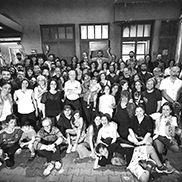
It was founded in 1990 by a group of feminists to combat violence against women. In 1987, after a court rejected the divorce request of a woman who had been subjected to violence, whereby the presiding judge remarked that “one should never leave a woman without batons on her back, and without babies in her womb”, feminists launched an effective campaign called “Women’s Solidarity Against Beatings”. Throughout the campaign, as they questioned the patriarchal mindset in Turkey and strived to support women subjected to violence, they also identified women’s need for legal aid and practical support. In 1989, they formed a solidarity network that provided support to women via hotline.
Since its inception, acting as a solidarity centre as well as an independent shelter, it has made efforts not to “help” women, but rather form a women’s solidarity against violence. Since 1990, the Solidarity Centre has been providing social, psychological, and legal support to women subjected to domestic violence, assisting them in starting an independent life. As of today, the Solidarity Centre has reached out to 45,000 women through its activities, and supported more than 1000 women and their children by operating the only independent women’s shelter in Turkey.
One of its key goals is to form a women’s solidarity network to exchange knowledge and experience, raise awareness, and disseminate feminist methods in countering violence against women. As part of its efforts to fight male violence, it has held information seminars and awareness workshops for hundreds of people including municipality staff, judges, prosecutors, lawyers, psychologists, social workers, and volunteers. It has published numerous books, reports, and brochures to share its experience.
The organisation primarily relies on the lived experiences of women while formulating its policies. It identifies women’s needs and maps the obstacles they face; it devises recommendations for legislative amendments accordingly. It submits reports to international mechanisms, stocktaking the performance and activities of public agencies, and seeking to bridge identified gaps and shortcomings. Moreover, it shares information with international networks, compiles, and reports on good practices. In an effort to exchange experience, hammer out joint policies, and establish a lasting communication network across organisations and agencies, it holds annual assemblies. It collaborates with independent women’s organisations in various campaigns and activities, and strives to exert pressure on public authorities.
In all its activities, the organisation is in pursuit of getting stronger together, and struggling together. To ensure women are able to take their own decisions, instead of telling their beneficiaries what to do, the organisation makes them become aware of all possible options. Regardless of their beneficiaries’ ultimate decisions, it always focuses on supporting and empowering women in putting their decision into practice.
Since its inception, acting as a solidarity centre as well as an independent shelter, it has made efforts not to “help” women, but rather form a women’s solidarity against violence. Since 1990, the Solidarity Centre has been providing social, psychological, and legal support to women subjected to domestic violence, assisting them in starting an independent life. As of today, the Solidarity Centre has reached out to 45,000 women through its activities, and supported more than 1000 women and their children by operating the only independent women’s shelter in Turkey.
One of its key goals is to form a women’s solidarity network to exchange knowledge and experience, raise awareness, and disseminate feminist methods in countering violence against women. As part of its efforts to fight male violence, it has held information seminars and awareness workshops for hundreds of people including municipality staff, judges, prosecutors, lawyers, psychologists, social workers, and volunteers. It has published numerous books, reports, and brochures to share its experience.
The organisation primarily relies on the lived experiences of women while formulating its policies. It identifies women’s needs and maps the obstacles they face; it devises recommendations for legislative amendments accordingly. It submits reports to international mechanisms, stocktaking the performance and activities of public agencies, and seeking to bridge identified gaps and shortcomings. Moreover, it shares information with international networks, compiles, and reports on good practices. In an effort to exchange experience, hammer out joint policies, and establish a lasting communication network across organisations and agencies, it holds annual assemblies. It collaborates with independent women’s organisations in various campaigns and activities, and strives to exert pressure on public authorities.
In all its activities, the organisation is in pursuit of getting stronger together, and struggling together. To ensure women are able to take their own decisions, instead of telling their beneficiaries what to do, the organisation makes them become aware of all possible options. Regardless of their beneficiaries’ ultimate decisions, it always focuses on supporting and empowering women in putting their decision into practice.
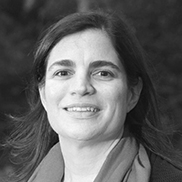
She holds a PhD in Politics from Princeton University, a JD from Yale Law School, an M.Phil in Social and Political Thought from Cambridge University, and a BA from Williams College.
Aslı Bâli is Professor of Law at Yale Law School where she teaches International Law, International Human Rights Law and advanced seminars in international humanitarian law. Bali co-directed Yale’s Kamel Center for the Study of Islamic Law and Civilization. Prior to joining the faculty at Yale, she was a professor at the UCLA School of Law where she was the Founding Faculty Director of the Promise Institute for Human Rights and Director of the UCLA Center for Near Eastern Studies. She currently serves as the President of the Middle East Studies Association of North America (MESA), the preeminent scholarly membership organization in the field. Her research focuses on two broad areas: public international law—including human rights and humanitarian law—and comparative constitutional law, with a focus on the Middle East. Her scholarship has appeared in numerous law reviews and peer-reviewed social science journals and she is co-editor of two volumes addressing different facets of institutional design and comparative constitutional law from Cambridge University Press. She co-chairs the Advisory Council for the Middle East and North Africa Division of Human Rights Watch and serves as a non-resident fellow of the Quincy Institute for Responsible Statecraft. Before becoming an academic, Bâli worked as a human rights lawyer at the United Nations Office of the High Commissioner for Human Rights.
Aslı Bâli is Professor of Law at Yale Law School where she teaches International Law, International Human Rights Law and advanced seminars in international humanitarian law. Bali co-directed Yale’s Kamel Center for the Study of Islamic Law and Civilization. Prior to joining the faculty at Yale, she was a professor at the UCLA School of Law where she was the Founding Faculty Director of the Promise Institute for Human Rights and Director of the UCLA Center for Near Eastern Studies. She currently serves as the President of the Middle East Studies Association of North America (MESA), the preeminent scholarly membership organization in the field. Her research focuses on two broad areas: public international law—including human rights and humanitarian law—and comparative constitutional law, with a focus on the Middle East. Her scholarship has appeared in numerous law reviews and peer-reviewed social science journals and she is co-editor of two volumes addressing different facets of institutional design and comparative constitutional law from Cambridge University Press. She co-chairs the Advisory Council for the Middle East and North Africa Division of Human Rights Watch and serves as a non-resident fellow of the Quincy Institute for Responsible Statecraft. Before becoming an academic, Bâli worked as a human rights lawyer at the United Nations Office of the High Commissioner for Human Rights.
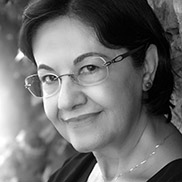
She completed her education at Ankara University Faculty of Political Sciences and York University. She is a founding member of the History Foundation and a member of the General Assembly of the Women's Library. She served as the Chair of the Department of Political Science at Istanbul University Faculty of Political Sciences and taught courses such as "Political Theory," "History of Political Thought," "Contemporary Political Theories," and "Theory of Democracy." In the Women Studies Department, she taught "Feminist Theories." She held the positions of Director of the Istanbul University, Women Studies Application and Research Center, Chairperson of the Women's Works Library and Information Center Foundation, and represented Turkey on various international platforms. Berktay, who has taught courses and given lectures at universities in the United States, Europe, and Australia, has published numerous articles and chapters in the fields of political science and women's studies, both domestically and internationally. Her work titled "Women in the Face of Monotheistic Religions" was published as "Women and Religion" in Canada, and her book titled "The Gender of History" was published in Lebanon under the title "El Huviyye en Nisaiye 'abr et Tarih." Following her books "The Call of Politics" and "Loving the World Today – Hannah Arendt's Understanding of Politics," she published a book titled "Ethics of Thinking," and she continues to work on political ethics, political evil, and feminist history..
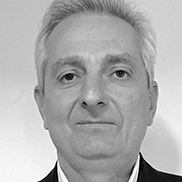
He is an attorney running a law office in Yerevan, Armenia. He specializes in international human rights law and criminal law. He has successfully litigated dozens of human rights cases in the European Court of Human Rights concerning gross human rights violations such as torture, detention, gross violations that occurred in times of war and military conflicts. As an expert, he provides consultancy to several international organizations such as the CoE, the EU, the UN on different human rights issues and different aspects of legal reforms in Armenia. He also teaches human rights law in the Justice Academy and the Academy of Advocates in Armenia. He has several publications concerning hate speech, hate crimes and other human rights issues.
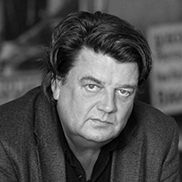
He is the founder and General Secretary of the European Center for Constitutional and Human Rights (ECCHR) in Berlin. He is a human rights attorney at the forefront of the legal fight to hold powerful individuals, corporations, and governments around the world accountable for human rights abuses. Kaleck represents whistleblower Edward Snowden in Europe and has written several books, including “The Concrete Utopia of Human Rights: A Look Back into the Future“ (2021) and “Law versus Power” (2018).
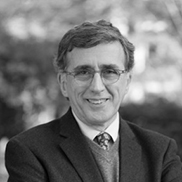
After graduating from the Economics-Statistics department of Middle East Technical University, he completed his master's education in the United States and obtained his doctorate in sociology from New York State University. He has been serving as a professor at the Henry M. Jackson School of International Studies at the University of Washington since 1985. He also served as the director of the same school from 2000 to 2010. Professor Kasaba also works as the director of the Near and Middle East Studies Ph.D. Program. He is a member of the Turkish Academy of Sciences.
He has authored and compiled seven books and more than 40 articles on topics related to the Ottoman Empire and modern Turkey. His latest research examines how the urban/rural divide emerged in Turkey and explores its continuation to the present day along with its political repercussions.
He has authored and compiled seven books and more than 40 articles on topics related to the Ottoman Empire and modern Turkey. His latest research examines how the urban/rural divide emerged in Turkey and explores its continuation to the present day along with its political repercussions.
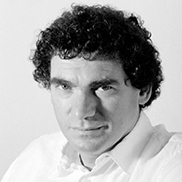
He was born in Istanbul. He received his music education at City University in London, where he received the Ricordi Conducting Award, and later at the Los Angeles Philharmonic Institute, where he studied under Leonard Bernstein. He served as the conductor of the Istanbul State Opera between 1981 and 1989. After a successful debut with the English Chamber Orchestra in London in 1985, he focused his work abroad. He has worked as a guest conductor with orchestras and opera companies in the Netherlands, France, Italy, the Czech Republic, Romania, Brazil, Hungary, Albania, Germany, Sweden, Spain, Mexico, Israel, Finland, Croatia, South Africa, Bulgaria, and Russia. As the founding conductor of the Turkish Youth Philharmonic Orchestra, he has also conducted the Turkey/Armenia and Turkey/Greece Youth Orchestras. He is the honorary president of Ipswich Choral Society, the second oldest choir in England. He is the music director of the Gedik Philharmonic Orchestra starting from the 2022-2023 season.
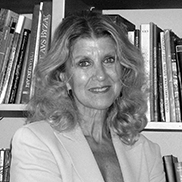
She is a journalist and writer, human rights defender, feminist and peace activist. She has served in the establishment and management of numerous civil society organizations. She founded Milliyet Sanat Magazine and managed it for almost 30 years. She is currently the President of PEN Writers Association, Turkey and a columnist for Cumhuriyet Newspaper. Through her writings, she has built bridges between social events and artistic events in the country, exalting and sharing universal and contemporary values. She has presented at numerous conferences on these topics both locally and outside of Turkey. She is among the founders and managers of various civil society organizations such as Turkey Theatre Critics Association, Nazım Hikmet Foundation, KA-DER, Turkey-Greece Friendship Association, and WINPEACE (Turkey-Greece Women's Peace Initiative). She has received numerous local and international awards including the IPI’s (International Press Institute-Vienna) "Press Freedom Dialogue Award"; UNESCO-Greece’s "Mothers Working for Peace Award"; Catalan PEN Writers Association’s “Free Voice Award”; Moscow Nazım Hikmet Friendship Award; French Government’s "Palmes Academiques Order" and "Knight Order of the Ministry of Culture and Communication".
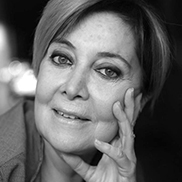
She was born in Istanbul. After Saint-Benoit French High School, she graduated from the Istanbul Municipality Conservatory Theater Department and Istanbul University Art History Department. She worked in public and private theaters, and acted and voiced characters in television and cinema films. She served as the general secretary of the Actors Union during its 2nd term. She currently serves on the discipline committee of Biroy and has been teaching at the Kadir Has University Theater Department for the last ten 10 years.
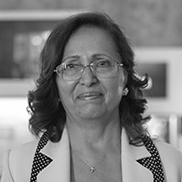
Rakel Dink became involved in human rights activism following the tragic assassination of her husband, the prominent Turkish-Armenian journalist and founder of Agos newspaper, Hrant Dink.
Born to an Armenian family in Silopi, southeastern Turkey, Rakel moved to Istanbul with tens of kids from Anatolia in order to receive education in Armenian Schools. She met with Hrant Dink at Camp Armen, where Armenian children orphans or those away from their families would spend their summers. Rakel and Hrant got married and became managers at Camp Armen in the following years until the property was seized by the state.
Following the death of Hrant Dink in January 2007, Rakel devoted her life to preserving her husband’s legacy. She established the Hrant Dink Foundation in 2007, with a mission to protect and uphold human rights in Turkey, preserve the identity and culture of minorities, address polarization, and normalize Turkish-Armenian relations. Rakel continues to be an optimist and maintains that despite the various challenges that she was forced to overcome throughout her life, she has been surrounded by love and kindness. She is hopeful for the future of Turkey and finds joy in her work and her family.
Born to an Armenian family in Silopi, southeastern Turkey, Rakel moved to Istanbul with tens of kids from Anatolia in order to receive education in Armenian Schools. She met with Hrant Dink at Camp Armen, where Armenian children orphans or those away from their families would spend their summers. Rakel and Hrant got married and became managers at Camp Armen in the following years until the property was seized by the state.
Following the death of Hrant Dink in January 2007, Rakel devoted her life to preserving her husband’s legacy. She established the Hrant Dink Foundation in 2007, with a mission to protect and uphold human rights in Turkey, preserve the identity and culture of minorities, address polarization, and normalize Turkish-Armenian relations. Rakel continues to be an optimist and maintains that despite the various challenges that she was forced to overcome throughout her life, she has been surrounded by love and kindness. She is hopeful for the future of Turkey and finds joy in her work and her family.
